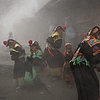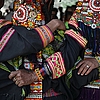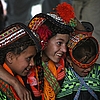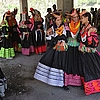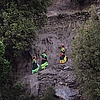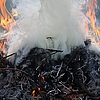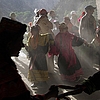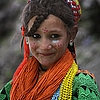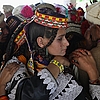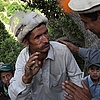Unveiled: The Pakistani tribe that dares to defy the fundamentalists
In the North West Frontier Province, the mullahs' word is law and the veil is worn. But one ancient tribe refuses to cover up. Jerome Taylor reports from the Rumbur Valley
In Pakistan's deeply conservative North West Frontier Province, the veil is simply a way of life. Whether in the bazaars of the capital Peshawar or high up in the myriad of Himalayan villages bordering Afghanistan, women wishing to leave their houses do so under the cover of a niqab or a billowing burqa. So important is the Islamic concept of purdah that the fort-like houses in the tribal areas usually contain separate living quarters for women and men.
Give or take the occasional advertising hoarding or glitzy film from Lahore, most men are unlikely to see an adult female face outside of their immediate family until they marry.
But in the remote Chitral region nestled high in the Hindu Kush mountain range are the last remnants of a tribe where the women walk unveiled in bright red and black dresses. Lavishly decorated with orange bead necklaces and colourful hats made from cowrie shells, they dance in public and are often free to marry and take lovers. They are the Kalasha, one of Pakistan's only remaining indigenous non-Muslim communities and a remarkable living throwback to a pre-Islamic era.
Yet according to the Kalasha themselves, their unique way of life is under attack like never before. Thanks to rising extremism among a small minority of Pakistanis and the growing appeal of populist orthodox mullahs who espouse sharia law and Taliban-like austerity, the Kalasha are increasingly in the firing line.
"We've always been called kafirs (infidels) but most people simply left us alone," says Azam Kalash, one of the few members of his 3,500-strong community who managed to go to university and now campaigns for his tribe's welfare. "Now we are deemed enemy number one. Particularly after September 11 and the wars in Afghanistan and Iraq, the missionaries and mullahs are determined to see us wiped out."
Isolated from the outside world by the remoteness of their valleys and the heavy Himalayan snows that block the mountain passes in winter, the Kalash somehow managed to survive successive waves of Muslim invaders and missionaries that pushed back the pre-Islamic Hindu, Buddhist and pagan tribes who once filled the fertile plains of the Indus valley.
Until last century, very few outsiders had ever made it as far as the three valleys of Rumbur, Bumboret and Birir where the Kalasha now live. Even today the valleys are only accessible by 4x4 along a tortuous road perilously carved into the shifting mountain side. But 20 years ago, following the Soviet invasion of Afghanistan and the rise of the religious mujahedin, things began to change.
"For a long time the Kalasha lived in total isolation," says Cecil Chaudhury, General Secretary of the All Pakistan Minorities Alliance. "I remember going there in the 1950s with a mountaineering expedition and they were blissfully happy living in their own distinct social system. But with the mujahedin came the missionaries and the Kalasha were always going to be an easy group to target. Now the extremists are back."
Although the fighters have largely disappeared from the Chitral region, the Kalasha are now outnumbered in their own villages by converts and outsiders. During the Soviet war in Afghanistan, the notoriously brutal Afghan warlord Gulbuddin Hekmatyar used the valley as his hideout and many believe he has returned to the region to continue his fight against Nato forces and the Afghan government.
After a 10-year lull, the missionaries are returning and many fear that if orthodox preachers, such as those who, until recently, ran Islamabad's Red Mosque, continue to increase their appeal, the country's last non-Muslim tribe may sink into oblivion.
No Kalasha would mean no Zonor Bibi. The mother of five sits on the front porch of her mud-walled house perched high above the swollen glacial river that roars through the heart of her village. It is harvest time and apricots lie drying in the summer sun eyed by her eight-year-old daughter Walena.
Zonor's husband has just set off on the daily three-hour walk to the grazing meadows that lie high above the village but that does not stop Zonor from welcoming outsiders with open arms, an act that would be unthinkable to her Muslim neighbours.
Deeply proud of her culture, she bursts into laughter when asked how long it takes to make the iconic cowrie shell hats that all Kalasha women wear.
"They take us months," she says. "It is important to continue our traditions so not to anger our spirits and god."
Kalasha believe that failure to practice their ancient traditions has profound religious implications and can bring disaster on the village which may explain why their dress and distinct practices have managed to survive against such odds.
The role of women in Kalash society is perhaps the most obvious aspect that separates their culture from their Muslim neighbours. Where Muslim women in the region generally remain indoors or hidden from public view, their Kalash counterparts are conspicuous in the fields working alongside their men. During the festivals that celebrate the various summer harvests and preparations for winter, it is not unusual to find Kalasha women drinking apricot wine and dancing in public with males that are neither their husband nor family. Although some marriages are arranged by families, it is perfectly acceptable for Kalasha women to choose their husbands. If they are treated unkindly during the marriage the women are expected to leave the house and take a lover.
Such comparative sexual and social freedom has led to the false but commonly held perception among many lowland Pakistanis that the tribe's women are sexually promiscuous. But while Kalasha men do seem to extend a greater level of physical and social freedom to their other halves, the lives of their women-folk are still strictly regimented.
To the Kalash the world is divided into two states, onjesta (pure, sacred) and pragata (impure, profane). Women are considered pragata, particularly during menstruation and childbirth where they are exiled to special huts away from the village. Only once they have purified themselves can they return to the tribe. Certain fields and shrines considered pure and sacred to the community are also out of bounds for the tribe's women.
Such peculiarly distinct customs have fascinated anthropologists, linguists and travellers alike for centuries, not just because the survival of the Kalasha in a sea of Islam is so unusual but because no one is sure exactly where they came from.
Their tongue, like many of the dialects spoken in the Hindu Kush range, is closest to the Dardic branch of the Indo-European languages of Central Asia. But Kalash oral history tells a different story, that they are descended from Shalak Shah, one of Alexander the Great's generals whose armies conquered as far as the Indus river before turning back towards Europe. Although blond hair and blue eyes are common amongst the Kalash, recent genetic testing has suggested that they may be an aboriginal group that are, in fact, indigenous to the area.
But how did the Kalasha manage to cling on to their distinct polytheistic pagan traditions in an area renowned for its particularly orthodox brand of Islam?
"I think they were just lucky," says Siraj Ul Mulk, a direct descendant of the Sunni Muslim royal family that once ruled the Chitral region until they ceded to Pakistan in the 1960s.
"Despite their orthodox appearance, Chitralis have always been very relaxed about the Kalasha and other minorities. The missionaries always tend to come from outside." Walking through the dusty fort that his father, the Mehtar of Chitral, once used as his summer palace, Mr Ul Mulk also offers another explanation for why the Kalasha of Pakistan remained unharmed: India's partition. "Under British partition we were lucky enough to be placed on the Pakistani side," he says. "If we'd ended up in Afghanistan I doubt the Kalasha would have survived."
Two hundred years ago Afghanistan was also home to numerous Kalasha tribes, known locally as the Red Kafirs, but they were annihilated at the end of the 19th century. After receiving a bloody nose in two disastrous conflicts with the Afghans, the British simply stood by as the founding father of modern Afghanistan, Abdur Rahman Khan, systematically forced the non-Muslim tribes in the east of the country to convert at the point of a sword. A small number of Afghan Kalasha managed to flee towards Chitral and can still be seen in the upper valleys wearing their distinctive red dresses but all Kalasha are fully aware of the threat that extremist beliefs pose to their very survival.
That the Kalash are frightened of the current climate in Pakistan is testament to how seriously they take the current threats. They survived the marauding armies of Tamerlaine, the religious zeal of Abdur Rahman and even the anti-Soviet mujahedin. But now, like many of Pakistan's religious and ethnic minorities, they once again feel unprotected and vulnerable.
"We've survived so much over the years and we're not about to give up now," says Azam Kalash. "For centuries we have lived happily alongside our Muslim neighbours but thanks to extremism our numbers are dwindling. Whether we'll survive this century I simply don't know."
In Pakistan's deeply conservative North West Frontier Province, the veil is simply a way of life. Whether in the bazaars of the capital Peshawar or high up in the myriad of Himalayan villages bordering Afghanistan, women wishing to leave their houses do so under the cover of a niqab or a billowing burqa. So important is the Islamic concept of purdah that the fort-like houses in the tribal areas usually contain separate living quarters for women and men.
Give or take the occasional advertising hoarding or glitzy film from Lahore, most men are unlikely to see an adult female face outside of their immediate family until they marry.
But in the remote Chitral region nestled high in the Hindu Kush mountain range are the last remnants of a tribe where the women walk unveiled in bright red and black dresses. Lavishly decorated with orange bead necklaces and colourful hats made from cowrie shells, they dance in public and are often free to marry and take lovers. They are the Kalasha, one of Pakistan's only remaining indigenous non-Muslim communities and a remarkable living throwback to a pre-Islamic era.
Yet according to the Kalasha themselves, their unique way of life is under attack like never before. Thanks to rising extremism among a small minority of Pakistanis and the growing appeal of populist orthodox mullahs who espouse sharia law and Taliban-like austerity, the Kalasha are increasingly in the firing line.
"We've always been called kafirs (infidels) but most people simply left us alone," says Azam Kalash, one of the few members of his 3,500-strong community who managed to go to university and now campaigns for his tribe's welfare. "Now we are deemed enemy number one. Particularly after September 11 and the wars in Afghanistan and Iraq, the missionaries and mullahs are determined to see us wiped out."
Isolated from the outside world by the remoteness of their valleys and the heavy Himalayan snows that block the mountain passes in winter, the Kalash somehow managed to survive successive waves of Muslim invaders and missionaries that pushed back the pre-Islamic Hindu, Buddhist and pagan tribes who once filled the fertile plains of the Indus valley.
Until last century, very few outsiders had ever made it as far as the three valleys of Rumbur, Bumboret and Birir where the Kalasha now live. Even today the valleys are only accessible by 4x4 along a tortuous road perilously carved into the shifting mountain side. But 20 years ago, following the Soviet invasion of Afghanistan and the rise of the religious mujahedin, things began to change.
"For a long time the Kalasha lived in total isolation," says Cecil Chaudhury, General Secretary of the All Pakistan Minorities Alliance. "I remember going there in the 1950s with a mountaineering expedition and they were blissfully happy living in their own distinct social system. But with the mujahedin came the missionaries and the Kalasha were always going to be an easy group to target. Now the extremists are back."
Although the fighters have largely disappeared from the Chitral region, the Kalasha are now outnumbered in their own villages by converts and outsiders. During the Soviet war in Afghanistan, the notoriously brutal Afghan warlord Gulbuddin Hekmatyar used the valley as his hideout and many believe he has returned to the region to continue his fight against Nato forces and the Afghan government.
After a 10-year lull, the missionaries are returning and many fear that if orthodox preachers, such as those who, until recently, ran Islamabad's Red Mosque, continue to increase their appeal, the country's last non-Muslim tribe may sink into oblivion.
No Kalasha would mean no Zonor Bibi. The mother of five sits on the front porch of her mud-walled house perched high above the swollen glacial river that roars through the heart of her village. It is harvest time and apricots lie drying in the summer sun eyed by her eight-year-old daughter Walena.
Zonor's husband has just set off on the daily three-hour walk to the grazing meadows that lie high above the village but that does not stop Zonor from welcoming outsiders with open arms, an act that would be unthinkable to her Muslim neighbours.
Deeply proud of her culture, she bursts into laughter when asked how long it takes to make the iconic cowrie shell hats that all Kalasha women wear.
"They take us months," she says. "It is important to continue our traditions so not to anger our spirits and god."
Kalasha believe that failure to practice their ancient traditions has profound religious implications and can bring disaster on the village which may explain why their dress and distinct practices have managed to survive against such odds.
The role of women in Kalash society is perhaps the most obvious aspect that separates their culture from their Muslim neighbours. Where Muslim women in the region generally remain indoors or hidden from public view, their Kalash counterparts are conspicuous in the fields working alongside their men. During the festivals that celebrate the various summer harvests and preparations for winter, it is not unusual to find Kalasha women drinking apricot wine and dancing in public with males that are neither their husband nor family. Although some marriages are arranged by families, it is perfectly acceptable for Kalasha women to choose their husbands. If they are treated unkindly during the marriage the women are expected to leave the house and take a lover.
Such comparative sexual and social freedom has led to the false but commonly held perception among many lowland Pakistanis that the tribe's women are sexually promiscuous. But while Kalasha men do seem to extend a greater level of physical and social freedom to their other halves, the lives of their women-folk are still strictly regimented.
To the Kalash the world is divided into two states, onjesta (pure, sacred) and pragata (impure, profane). Women are considered pragata, particularly during menstruation and childbirth where they are exiled to special huts away from the village. Only once they have purified themselves can they return to the tribe. Certain fields and shrines considered pure and sacred to the community are also out of bounds for the tribe's women.
Such peculiarly distinct customs have fascinated anthropologists, linguists and travellers alike for centuries, not just because the survival of the Kalasha in a sea of Islam is so unusual but because no one is sure exactly where they came from.
Their tongue, like many of the dialects spoken in the Hindu Kush range, is closest to the Dardic branch of the Indo-European languages of Central Asia. But Kalash oral history tells a different story, that they are descended from Shalak Shah, one of Alexander the Great's generals whose armies conquered as far as the Indus river before turning back towards Europe. Although blond hair and blue eyes are common amongst the Kalash, recent genetic testing has suggested that they may be an aboriginal group that are, in fact, indigenous to the area.
But how did the Kalasha manage to cling on to their distinct polytheistic pagan traditions in an area renowned for its particularly orthodox brand of Islam?
"I think they were just lucky," says Siraj Ul Mulk, a direct descendant of the Sunni Muslim royal family that once ruled the Chitral region until they ceded to Pakistan in the 1960s.
"Despite their orthodox appearance, Chitralis have always been very relaxed about the Kalasha and other minorities. The missionaries always tend to come from outside." Walking through the dusty fort that his father, the Mehtar of Chitral, once used as his summer palace, Mr Ul Mulk also offers another explanation for why the Kalasha of Pakistan remained unharmed: India's partition. "Under British partition we were lucky enough to be placed on the Pakistani side," he says. "If we'd ended up in Afghanistan I doubt the Kalasha would have survived."
Two hundred years ago Afghanistan was also home to numerous Kalasha tribes, known locally as the Red Kafirs, but they were annihilated at the end of the 19th century. After receiving a bloody nose in two disastrous conflicts with the Afghans, the British simply stood by as the founding father of modern Afghanistan, Abdur Rahman Khan, systematically forced the non-Muslim tribes in the east of the country to convert at the point of a sword. A small number of Afghan Kalasha managed to flee towards Chitral and can still be seen in the upper valleys wearing their distinctive red dresses but all Kalasha are fully aware of the threat that extremist beliefs pose to their very survival.
That the Kalash are frightened of the current climate in Pakistan is testament to how seriously they take the current threats. They survived the marauding armies of Tamerlaine, the religious zeal of Abdur Rahman and even the anti-Soviet mujahedin. But now, like many of Pakistan's religious and ethnic minorities, they once again feel unprotected and vulnerable.
"We've survived so much over the years and we're not about to give up now," says Azam Kalash. "For centuries we have lived happily alongside our Muslim neighbours but thanks to extremism our numbers are dwindling. Whether we'll survive this century I simply don't know."
In Pakistan's deeply conservative North West Frontier Province, the veil is simply a way of life. Whether in the bazaars of the capital Peshawar or high up in the myriad of Himalayan villages bordering Afghanistan, women wishing to leave their houses do so under the cover of a niqab or a billowing burqa. So important is the Islamic concept of purdah that the fort-like houses in the tribal areas usually contain separate living quarters for women and men.
Give or take the occasional advertising hoarding or glitzy film from Lahore, most men are unlikely to see an adult female face outside of their immediate family until they marry.
But in the remote Chitral region nestled high in the Hindu Kush mountain range are the last remnants of a tribe where the women walk unveiled in bright red and black dresses. Lavishly decorated with orange bead necklaces and colourful hats made from cowrie shells, they dance in public and are often free to marry and take lovers. They are the Kalasha, one of Pakistan's only remaining indigenous non-Muslim communities and a remarkable living throwback to a pre-Islamic era.
Yet according to the Kalasha themselves, their unique way of life is under attack like never before. Thanks to rising extremism among a small minority of Pakistanis and the growing appeal of populist orthodox mullahs who espouse sharia law and Taliban-like austerity, the Kalasha are increasingly in the firing line.
"We've always been called kafirs (infidels) but most people simply left us alone," says Azam Kalash, one of the few members of his 3,500-strong community who managed to go to university and now campaigns for his tribe's welfare. "Now we are deemed enemy number one. Particularly after September 11 and the wars in Afghanistan and Iraq, the missionaries and mullahs are determined to see us wiped out."
Isolated from the outside world by the remoteness of their valleys and the heavy Himalayan snows that block the mountain passes in winter, the Kalash somehow managed to survive successive waves of Muslim invaders and missionaries that pushed back the pre-Islamic Hindu, Buddhist and pagan tribes who once filled the fertile plains of the Indus valley.
Until last century, very few outsiders had ever made it as far as the three valleys of Rumbur, Bumboret and Birir where the Kalasha now live. Even today the valleys are only accessible by 4x4 along a tortuous road perilously carved into the shifting mountain side. But 20 years ago, following the Soviet invasion of Afghanistan and the rise of the religious mujahedin, things began to change.
"For a long time the Kalasha lived in total isolation," says Cecil Chaudhury, General Secretary of the All Pakistan Minorities Alliance. "I remember going there in the 1950s with a mountaineering expedition and they were blissfully happy living in their own distinct social system. But with the mujahedin came the missionaries and the Kalasha were always going to be an easy group to target. Now the extremists are back."
Although the fighters have largely disappeared from the Chitral region, the Kalasha are now outnumbered in their own villages by converts and outsiders. During the Soviet war in Afghanistan, the notoriously brutal Afghan warlord Gulbuddin Hekmatyar used the valley as his hideout and many believe he has returned to the region to continue his fight against Nato forces and the Afghan government.
After a 10-year lull, the missionaries are returning and many fear that if orthodox preachers, such as those who, until recently, ran Islamabad's Red Mosque, continue to increase their appeal, the country's last non-Muslim tribe may sink into oblivion.
No Kalasha would mean no Zonor Bibi. The mother of five sits on the front porch of her mud-walled house perched high above the swollen glacial river that roars through the heart of her village. It is harvest time and apricots lie drying in the summer sun eyed by her eight-year-old daughter Walena.
Zonor's husband has just set off on the daily three-hour walk to the grazing meadows that lie high above the village but that does not stop Zonor from welcoming outsiders with open arms, an act that would be unthinkable to her Muslim neighbours.
Deeply proud of her culture, she bursts into laughter when asked how long it takes to make the iconic cowrie shell hats that all Kalasha women wear.
"They take us months," she says. "It is important to continue our traditions so not to anger our spirits and god."
Kalasha believe that failure to practice their ancient traditions has profound religious implications and can bring disaster on the village which may explain why their dress and distinct practices have managed to survive against such odds.
The role of women in Kalash society is perhaps the most obvious aspect that separates their culture from their Muslim neighbours. Where Muslim women in the region generally remain indoors or hidden from public view, their Kalash counterparts are conspicuous in the fields working alongside their men. During the festivals that celebrate the various summer harvests and preparations for winter, it is not unusual to find Kalasha women drinking apricot wine and dancing in public with males that are neither their husband nor family. Although some marriages are arranged by families, it is perfectly acceptable for Kalasha women to choose their husbands. If they are treated unkindly during the marriage the women are expected to leave the house and take a lover.
Such comparative sexual and social freedom has led to the false but commonly held perception among many lowland Pakistanis that the tribe's women are sexually promiscuous. But while Kalasha men do seem to extend a greater level of physical and social freedom to their other halves, the lives of their women-folk are still strictly regimented.
To the Kalash the world is divided into two states, onjesta (pure, sacred) and pragata (impure, profane). Women are considered pragata, particularly during menstruation and childbirth where they are exiled to special huts away from the village. Only once they have purified themselves can they return to the tribe. Certain fields and shrines considered pure and sacred to the community are also out of bounds for the tribe's women.
Such peculiarly distinct customs have fascinated anthropologists, linguists and travellers alike for centuries, not just because the survival of the Kalasha in a sea of Islam is so unusual but because no one is sure exactly where they came from.
Their tongue, like many of the dialects spoken in the Hindu Kush range, is closest to the Dardic branch of the Indo-European languages of Central Asia. But Kalash oral history tells a different story, that they are descended from Shalak Shah, one of Alexander the Great's generals whose armies conquered as far as the Indus river before turning back towards Europe. Although blond hair and blue eyes are common amongst the Kalash, recent genetic testing has suggested that they may be an aboriginal group that are, in fact, indigenous to the area.
But how did the Kalasha manage to cling on to their distinct polytheistic pagan traditions in an area renowned for its particularly orthodox brand of Islam?
"I think they were just lucky," says Siraj Ul Mulk, a direct descendant of the Sunni Muslim royal family that once ruled the Chitral region until they ceded to Pakistan in the 1960s.
"Despite their orthodox appearance, Chitralis have always been very relaxed about the Kalasha and other minorities. The missionaries always tend to come from outside." Walking through the dusty fort that his father, the Mehtar of Chitral, once used as his summer palace, Mr Ul Mulk also offers another explanation for why the Kalasha of Pakistan remained unharmed: India's partition. "Under British partition we were lucky enough to be placed on the Pakistani side," he says. "If we'd ended up in Afghanistan I doubt the Kalasha would have survived."
Two hundred years ago Afghanistan was also home to numerous Kalasha tribes, known locally as the Red Kafirs, but they were annihilated at the end of the 19th century. After receiving a bloody nose in two disastrous conflicts with the Afghans, the British simply stood by as the founding father of modern Afghanistan, Abdur Rahman Khan, systematically forced the non-Muslim tribes in the east of the country to convert at the point of a sword. A small number of Afghan Kalasha managed to flee towards Chitral and can still be seen in the upper valleys wearing their distinctive red dresses but all Kalasha are fully aware of the threat that extremist beliefs pose to their very survival.
That the Kalash are frightened of the current climate in Pakistan is testament to how seriously they take the current threats. They survived the marauding armies of Tamerlaine, the religious zeal of Abdur Rahman and even the anti-Soviet mujahedin. But now, like many of Pakistan's religious and ethnic minorities, they once again feel unprotected and vulnerable.
"We've survived so much over the years and we're not about to give up now," says Azam Kalash. "For centuries we have lived happily alongside our Muslim neighbours but thanks to extremism our numbers are dwindling. Whether we'll survive this century I simply don't know."
In Pakistan's deeply conservative North West Frontier Province, the veil is simply a way of life. Whether in the bazaars of the capital Peshawar or high up in the myriad of Himalayan villages bordering Afghanistan, women wishing to leave their houses do so under the cover of a niqab or a billowing burqa. So important is the Islamic concept of purdah that the fort-like houses in the tribal areas usually contain separate living quarters for women and men.
Give or take the occasional advertising hoarding or glitzy film from Lahore, most men are unlikely to see an adult female face outside of their immediate family until they marry.
But in the remote Chitral region nestled high in the Hindu Kush mountain range are the last remnants of a tribe where the women walk unveiled in bright red and black dresses. Lavishly decorated with orange bead necklaces and colourful hats made from cowrie shells, they dance in public and are often free to marry and take lovers. They are the Kalasha, one of Pakistan's only remaining indigenous non-Muslim communities and a remarkable living throwback to a pre-Islamic era.
Yet according to the Kalasha themselves, their unique way of life is under attack like never before. Thanks to rising extremism among a small minority of Pakistanis and the growing appeal of populist orthodox mullahs who espouse sharia law and Taliban-like austerity, the Kalasha are increasingly in the firing line.
"We've always been called kafirs (infidels) but most people simply left us alone," says Azam Kalash, one of the few members of his 3,500-strong community who managed to go to university and now campaigns for his tribe's welfare. "Now we are deemed enemy number one. Particularly after September 11 and the wars in Afghanistan and Iraq, the missionaries and mullahs are determined to see us wiped out."
Isolated from the outside world by the remoteness of their valleys and the heavy Himalayan snows that block the mountain passes in winter, the Kalash somehow managed to survive successive waves of Muslim invaders and missionaries that pushed back the pre-Islamic Hindu, Buddhist and pagan tribes who once filled the fertile plains of the Indus valley.
Until last century, very few outsiders had ever made it as far as the three valleys of Rumbur, Bumboret and Birir where the Kalasha now live. Even today the valleys are only accessible by 4x4 along a tortuous road perilously carved into the shifting mountain side. But 20 years ago, following the Soviet invasion of Afghanistan and the rise of the religious mujahedin, things began to change.
"For a long time the Kalasha lived in total isolation," says Cecil Chaudhury, General Secretary of the All Pakistan Minorities Alliance. "I remember going there in the 1950s with a mountaineering expedition and they were blissfully happy living in their own distinct social system. But with the mujahedin came the missionaries and the Kalasha were always going to be an easy group to target. Now the extremists are back."
Although the fighters have largely disappeared from the Chitral region, the Kalasha are now outnumbered in their own villages by converts and outsiders. During the Soviet war in Afghanistan, the notoriously brutal Afghan warlord Gulbuddin Hekmatyar used the valley as his hideout and many believe he has returned to the region to continue his fight against Nato forces and the Afghan government.
After a 10-year lull, the missionaries are returning and many fear that if orthodox preachers, such as those who, until recently, ran Islamabad's Red Mosque, continue to increase their appeal, the country's last non-Muslim tribe may sink into oblivion.
No Kalasha would mean no Zonor Bibi. The mother of five sits on the front porch of her mud-walled house perched high above the swollen glacial river that roars through the heart of her village. It is harvest time and apricots lie drying in the summer sun eyed by her eight-year-old daughter Walena.
Zonor's husband has just set off on the daily three-hour walk to the grazing meadows that lie high above the village but that does not stop Zonor from welcoming outsiders with open arms, an act that would be unthinkable to her Muslim neighbours.
Deeply proud of her culture, she bursts into laughter when asked how long it takes to make the iconic cowrie shell hats that all Kalasha women wear.
"They take us months," she says. "It is important to continue our traditions so not to anger our spirits and god."
Kalasha believe that failure to practice their ancient traditions has profound religious implications and can bring disaster on the village which may explain why their dress and distinct practices have managed to survive against such odds.
The role of women in Kalash society is perhaps the most obvious aspect that separates their culture from their Muslim neighbours. Where Muslim women in the region generally remain indoors or hidden from public view, their Kalash counterparts are conspicuous in the fields working alongside their men. During the festivals that celebrate the various summer harvests and preparations for winter, it is not unusual to find Kalasha women drinking apricot wine and dancing in public with males that are neither their husband nor family. Although some marriages are arranged by families, it is perfectly acceptable for Kalasha women to choose their husbands. If they are treated unkindly during the marriage the women are expected to leave the house and take a lover.
Such comparative sexual and social freedom has led to the false but commonly held perception among many lowland Pakistanis that the tribe's women are sexually promiscuous. But while Kalasha men do seem to extend a greater level of physical and social freedom to their other halves, the lives of their women-folk are still strictly regimented.
To the Kalash the world is divided into two states, onjesta (pure, sacred) and pragata (impure, profane). Women are considered pragata, particularly during menstruation and childbirth where they are exiled to special huts away from the village. Only once they have purified themselves can they return to the tribe. Certain fields and shrines considered pure and sacred to the community are also out of bounds for the tribe's women.
Such peculiarly distinct customs have fascinated anthropologists, linguists and travellers alike for centuries, not just because the survival of the Kalasha in a sea of Islam is so unusual but because no one is sure exactly where they came from.
Their tongue, like many of the dialects spoken in the Hindu Kush range, is closest to the Dardic branch of the Indo-European languages of Central Asia. But Kalash oral history tells a different story, that they are descended from Shalak Shah, one of Alexander the Great's generals whose armies conquered as far as the Indus river before turning back towards Europe. Although blond hair and blue eyes are common amongst the Kalash, recent genetic testing has suggested that they may be an aboriginal group that are, in fact, indigenous to the area.
But how did the Kalasha manage to cling on to their distinct polytheistic pagan traditions in an area renowned for its particularly orthodox brand of Islam?
"I think they were just lucky," says Siraj Ul Mulk, a direct descendant of the Sunni Muslim royal family that once ruled the Chitral region until they ceded to Pakistan in the 1960s.
"Despite their orthodox appearance, Chitralis have always been very relaxed about the Kalasha and other minorities. The missionaries always tend to come from outside." Walking through the dusty fort that his father, the Mehtar of Chitral, once used as his summer palace, Mr Ul Mulk also offers another explanation for why the Kalasha of Pakistan remained unharmed: India's partition. "Under British partition we were lucky enough to be placed on the Pakistani side," he says. "If we'd ended up in Afghanistan I doubt the Kalasha would have survived."
Two hundred years ago Afghanistan was also home to numerous Kalasha tribes, known locally as the Red Kafirs, but they were annihilated at the end of the 19th century. After receiving a bloody nose in two disastrous conflicts with the Afghans, the British simply stood by as the founding father of modern Afghanistan, Abdur Rahman Khan, systematically forced the non-Muslim tribes in the east of the country to convert at the point of a sword. A small number of Afghan Kalasha managed to flee towards Chitral and can still be seen in the upper valleys wearing their distinctive red dresses but all Kalasha are fully aware of the threat that extremist beliefs pose to their very survival.
That the Kalash are frightened of the current climate in Pakistan is testament to how seriously they take the current threats. They survived the marauding armies of Tamerlaine, the religious zeal of Abdur Rahman and even the anti-Soviet mujahedin. But now, like many of Pakistan's religious and ethnic minorities, they once again feel unprotected and vulnerable.
"We've survived so much over the years and we're not about to give up now," says Azam Kalash. "For centuries we have lived happily alongside our Muslim neighbours but thanks to extremism our numbers are dwindling. Whether we'll survive this century I simply don't know."
When I ran across these jaw-droppingly striking pictures, I couldn't believe I'd never heard of the Kalash Tribe — and I wanted to rectify that immediately. The
tribe lives nestled in the North-Western Province of Pakistan. Protected by the Hindu Kush mountain range lives this culture of people Muslims call Kafirs or "infidels".

Among the region known as Kafiristan lies the town of Brir, considered one of the last remaining settlements of the Kalash — or "wearers of black." Its inhabitants consider themselves the direct descendants of Alexander the Great. The 3,500 souls are the last enclave of pagan tribespeople.
Incredibly, the Kalash have not changed much over the centuries. They make their own wine, elevate animals to religious status and believe in mountaintop fairies. To find out more about the tribe, read more.
Their gods, like those of the ancient Greeks, are split up into male and female deities and they claim they once belonged to highly literate culture until their books were burned by barbarian tribes. Shown in these pictures celebrating their annual Spring festival, the Kalash still maintain a fertility rite where a teenage boy is sent alone into the surrounding woods for a year and when he returns is treated to a feast and the mating rites to as many of the Kalash women he chooses.
They struggle to preserve their identity from encroaching Islamic rule, deforestation, and entrepreneurs who take advantage of their simple natures — as well as the assault of the Justin Timberlake/cell phone/jeans avalanche of the modern world. Here's to hoping they resist — I'm so taken with the fact that real diversity still exists in our ever-shrinking world.
Have you heard of
the Kalash? Have you ever seen such beautiful pictures? Is it possible to maintain an untouched culture in our modern age?
__._,_.___
[* Moderator's Note - CHOTTALA is a non-profit, non-religious, non-political and non-discriminatory organization.
* Disclaimer: Any posting to the CHOTTALA are the opinion of the author. Authors of the messages to the CHOTTALA are responsible for the accuracy of their information and the conformance of their material with applicable copyright and other laws. Many people will read your post, and it will be archived for a very long time. The act of posting to the CHOTTALA indicates the subscriber's agreement to accept the adjudications of the moderator]

__,_._,___



